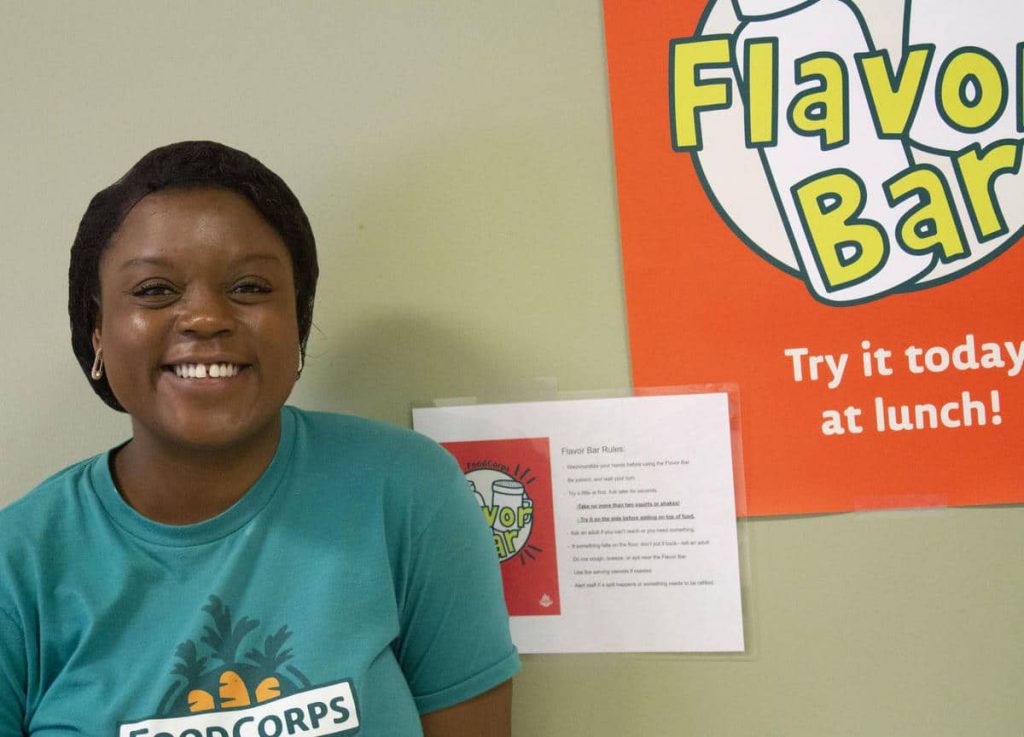Kids Have Been Eating Healthier School Meals, But Adults May Change The Rules
The introduction of a flavor bar, full of spices and sauces, makes lunchtime more delicious for students at some Iowa elementary schools.
The introduction of a flavor bar, full of spices and sauces, makes lunchtime more delicious for students at some Iowa elementary schools.

By Amy Mayer for Iowa Public Radio
After the day’s meals are done on a recent Tuesday, Gilbert Community Schools director of food service Deb Purcell shuffles through a stack of papers. Gilbert, a town north of Ames in central Iowa, serves about 1400-1600 meals a day.
“This is what I do, planning for a week,” Purcell says pointing to columns on a page. “And there’s actually seven pages minimum that go with each day.”
She’s counting cups of vegetables and documenting other details about every meal she’s served to comply with stringent federal rules. Her job could soon get easier.
The Trump administration has been loosening some of the regulations. It canceled planned sodium reductions and allowed low-fat flavored milk last year. One of the current proposals would ease the rules for meat and meat alternatives at breakfast and the types of vegetables required at lunch. …
At Wright Elementary in Cedar Rapids, Iowa, all of the students can eat breakfast or lunch at no cost to their families thanks to a federal grant. Without that, about 75 percent of the students would qualify for free or reduced-price meals.
On a recent day, students choose chicken alfredo over noodles, grilled cheese or pizza from the hot line and then serve themselves applesauce, raw broccoli florets or hot mixed vegetables at the veggie cart. They can also try something new — the Flavor Bar.
A boy points to a tub of yellow strips and rings on the small table and says, “What’s that?” Dainese Pridegon tells him they are banana peppers, and another student pipes up, “They’re really good!”
Pridegon helps the students serve themselves peppers or sprinkle cinnamon on their applesauce. She’s part of FoodCorps, a national service program that brings lessons on healthy eating to schools. It’s rolling out pilot Flavor Bars in 15 cafeterias to literally spice up school meals.
Pridegon guides the students as they pour hot sauce onto their trays or shake chili powder over their pasta.
“I don’t want them to drench their food in the flavor and not taste the food,” she says.
This is the first week of the Flavor Bar here, but Pridegon also set one up at another Cedar Rapids school.
“I remember someone wanted to put cinnamon on their mashed potatoes once and I try to, like, coach and encourage them not to do silly things but actually do things they’re going to want to eat.”
Students voted on toppings they wanted on the Flavor Bar, and then it was up to Pridegon to figure out which ones would work within the rules for calories, sodium and so forth. Parmesan cheese and salt were non-starters.
“We definitely had to make sure that all of our flavors would keep us within our limits and not take us over,” she says.

FoodCorps in the News: 2024

FoodCorps’ Statement on the 2024 Election

FoodCorps Welcomes Rachel Willis as Interim President